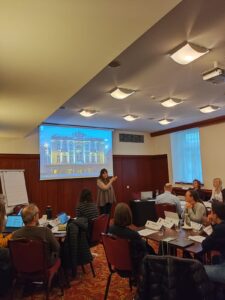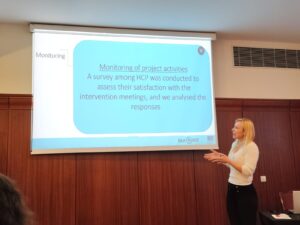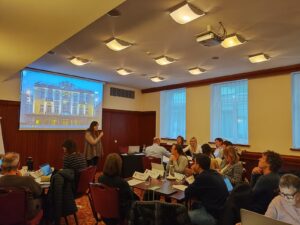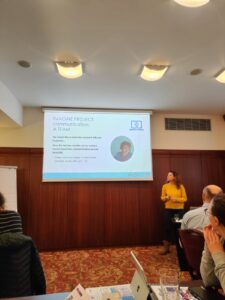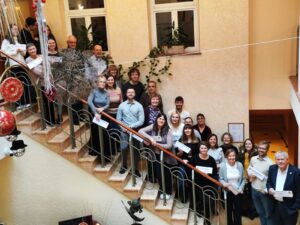The IMAGINE Project held its fifth face-to-face meeting on November 28–29 to review the work done by the consortium during the last 6 months and to plan the next steps for its final year. Ruta Radzeviciene and Lina Jaruseviciene, on behalf of the partner Mano šeimos gydytojas (My Family Doctor), hosted and organized the meeting in Vilnius, Lithuania, bringing together representatives from all partners.
Sharing intervention meeting experiences
On the first day, coordinators from all participating countries (Hungary, Denmark, Slovakia, Lithuania, Slovenia, Spain, Greece, and Poland) reported on the intervention meetings with the IMAGINE nursing homes in their countries. Intervention meetings are one of the cornerstones of the IMAGINE project, as they aim to enhance infection prevention and control measures, together with improving urinary tract infection diagnosis and antibiotic appropriateness for all infections.
All countries agreed that the intervention meetings were a success, with a high attendance rate despite the difficulties of attending prolonged off-site sessions for the nursing home staff. Nurses, nurse assistants, doctors, social workers, and other professionals working in the nursing home attended the different workshops (around 300 participants in total, representing more than 90 nursing homes). These professionals are now IMAGINE ambassadors, in charge of bringing the training and best practices to the rest of the professionals in their nursing home.
Feedback from the professionals attending the workshops highlighted the quality and practicality of the intervention, emphasizing the opportunity to exchange experiences with fellow professionals and the usefulness of the toolbox created for their nursing homes.
During the first day of the meeting, the consortium also planned the upcoming phase of the project: from February 1 to April 30, 2025, the second registration will take place across participating nursing homes. This phase aims to compare data with the first registration to assess whether the interventions have successfully reduced the inappropriate use of antibiotics, the incidence of infections, and increased hygiene elements in nursing homes. In the afternoon, the team reviewed the tools developed for the project, analyzing feedback to identify which were most valued by care home professionals.
Evaluation and communication strategies
The second day focused on the project’s evaluation, led by the WP5 team. They presented feedback from the intervention meetings in each country and discussed the upcoming economic impact assessment related to reduced antibiotic misuse.
The meeting concluded with a review of recent communication efforts, which have increased website and social media engagement. Future communication strategies were also discussed, focusing on effectively sharing project outcomes with stakeholders and ensuring the dissemination of all developed resources by the project’s end. Furthermore, as IMAGINE is starting its final year, special focus was placed on how to increase the impact of the IMAGINE strategy and its implementation in other settings and countries.
The IMAGINE Project continues to demonstrate its commitment to improving antibiotic use in nursing homes, with promising engagement and future milestones ahead.
